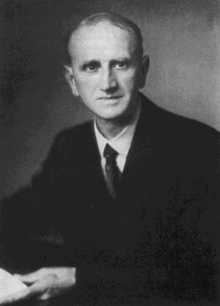Alexander C. Aitken | |
|---|---|
 | |
| Born | 1 April 1895 |
| Died | 3 November 1967 (aged 72) |
| Nationality | New Zealander |
| Alma mater | University of Edinburgh University of Otago |
| Known for | Aitken's array Aitken's delta-squared process Aitken interpolation |
| Spouse | Winifred Betts |
| Awards | Fellow of the Royal Society[1] |
| Scientific career | |
| Fields | Mathematics Statistics |
| Institutions | University of Edinburgh |
| Thesis | Smoothing of Data |
| Doctoral advisor | E. T. Whittaker[2] |
| Doctoral students | Hans Schneider[2] Alexander Fairley Buchan[2] Nora Calderwood[2] Henry Daniels[2] Harold Silverstone[2] Donald Livingstone[2] |
Alexander Craig "Alec" Aitken FRS FRSE FRSL FRSNZ (1 April 1895 – 3 November 1967) was one of New Zealand's most eminent mathematicians.[3][4] In a 1935 paper he introduced the concept of generalized least squares, along with now standard vector/matrix notation for the linear regression model.[5] Another influential paper co-authored with his student Harold Silverstone established the lower bound on the variance of an estimator,[6] now known as Cramér–Rao bound.[7] He was elected to the Royal Society of Literature for his World War I memoir, Gallipoli to the Somme.[8]
- ^ Whittaker, J. M.; Bartlett, M. S. (1968). "Alexander Craig Aitken 1895-1967". Biographical Memoirs of Fellows of the Royal Society. 14: 1–14. doi:10.1098/rsbm.1968.0001.
- ^ a b c d e f g Alexander Aitken at the Mathematics Genealogy Project
- ^ "Alexander Aitken THE HUMAN COMPUTER". NZ Edge. Archived from the original on 3 February 2009. Retrieved 7 December 2005.
- ^ O'Connor, John J.; Robertson, Edmund F., "Alexander Aitken", MacTutor History of Mathematics Archive, University of St Andrews
- ^ Aitken, A. C. (1935). "On Least Squares and Linear Combinations of Observations". Proceedings of the Royal Society of Edinburgh. 55: 42–48. doi:10.1017/s0370164600014346.
- ^ Aitken, A. C.; Silverstone, H. (1942). "On the Estimation of Statistical Parameters". Proceedings of the Royal Society of Edinburgh. 61 (2): 186–194. doi:10.1017/s008045410000618x. S2CID 124029876.
- ^ Shenton, L. R. (1970). "The so-called Cramer–Rao inequality". The American Statistician. 24 (2): 36. JSTOR 2681931.
- ^ "Review: Gallipoli to the Somme: Recollections of a New Zealand Infantryman by Alexander Aitken". Stuff. 21 April 2018. Retrieved 1 May 2019.